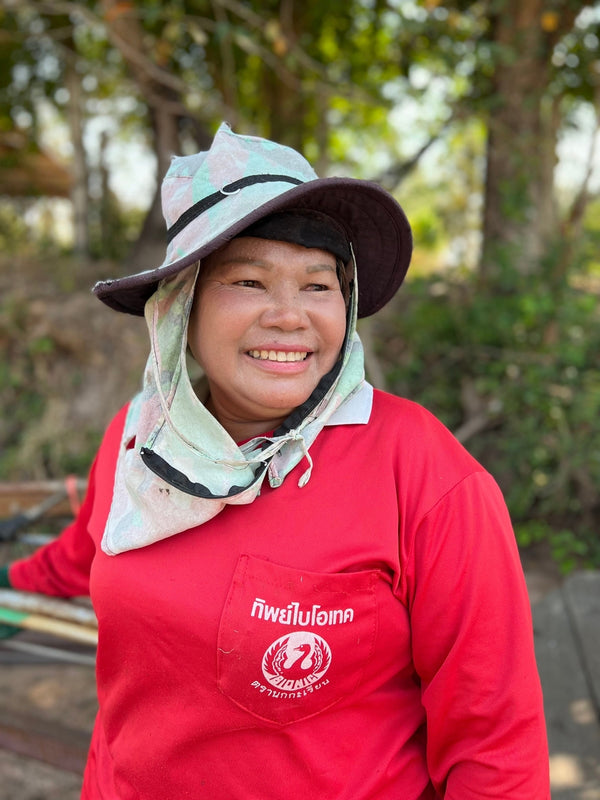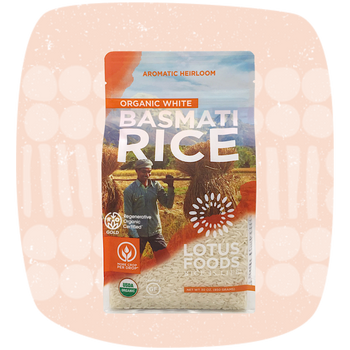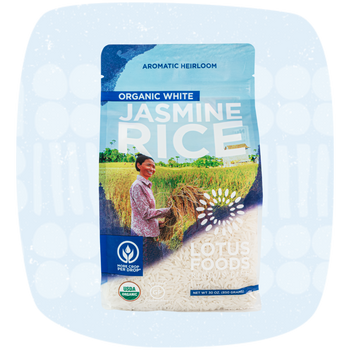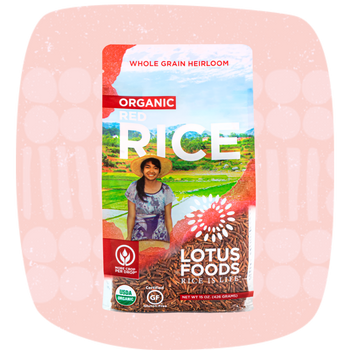More Crop Per Drop®
October 23, 2023
What is More Crop Per Drop®?
More Crop Per Drop® is how we refer to the agroecological rice-growing method System of Rice Intensification (SRI). More Crop Per Drop® agricultural practices improve the health and working conditions of over 20 million people whose livelihoods depend on rice, all while supporting a healthier global environment.
There is a better, regenerative way to grow rice.
In 2005, our founders learned of the System of Rice Intensification (SRI), a set of practices and principles that enable even the poorest farmers to improve their yields just by changing how they manage their plants, soil, water, and nutrients. Farmers can double and triple their harvests using up to 50 percent less water, 90 percent less seed, and no agrochemicals, with less work for women, who generally bear the brunt of the hardest labor of rice farming. Since 2008, we have worked to develop supply chains with marginalized rice farmers — who previously never had access to global markets — by offering organic and fair-trade premiums as incentives for farmers to adopt an organic version of SRI. We call this organic version of SRI, More Crop Per Drop® (MCPD®)
The Key Principles of More Crop Per Drop® are:
-
Transplant smaller, younger seedlings to reduce transplant shock
-
Plant rice seedlings more widely spaced and in rows to minimize competition and make weeding easier
-
Build soil health by using compost and organic fertilizer, which eliminates the application of synthetic fertilizers and pesticides
-
Keep soil moist but not flooded, which significantly reduces water use, promotes healthy soils, and cuts methane emissions

Combining intelligent farming practices and ecological knowledge, MCPD® practices mitigate climate change and contribute to the well-being of people, farmers, and our environment with:
-
INCREASED CROP YIELD
Up to 2-3 times
-
INCREASED INCOME
Lower costs and higher yields
-
FEWER SEEDS
Up to 90% fewer
-
WATER SAVINGS
25-50% less water used
-
REDUCED GREENHOUSE GAS EMISSIONS
40% avg. reduction in methane gas
-
IMPROVED SOIL HEALTH
More diverse and prolific soil microorganisms; increased capacity to sequester carbon
-
LESS WORK FOR WOMEN
About 185 fewer working hours for women per season
Farmers do not need special seeds or agrochemicals. They boost yields by changing how they grow rice to optimize the plants’ development. They transplant younger seedlings and plant them in wide rows, instead of random clumps of older seedlings. This reduces transplant shock and competition among plants, and enables mechanical weeding. Soils are kept moist, not flooded, promoting soil health and root growth. Rice plants actually grow better in soils that have access to oxygen, which a blanket of water shuts out.
Farming families enjoy increased food security and improved nutrition.

Because MCPD® growing practices significantly increase yields, farming families enjoy increased food security and improved nutrition, with the ability to remove a portion of their land from rice paddy production to grow fruits and vegetables, or to raise poultry. Higher yields and more diverse farming also allow for increased incomes and more livelihood options.
Finally, MCPD® has important implications for women, who perform the majority of work associated with rice cultivation. Because rice paddies are not flooded constantly, women no longer have to stand or squat in muddy water, which alleviates the associated health issues such as skin ailments, gynecological issues, and exposure to water-borne illnesses. Because they have many fewer and lighter seedlings to manage, women can do the work faster and during hours when the sun is not so hot. And thanks to the introduction of a simple rotary weeder they can weed fields faster and in an upright, rather than bent-over posture, minimizing back aches and musculoskeletal disorders.
In 2019 Lotus Foods was among the first brands to work with the Regenerative Organic Alliance to pilot new standards that go beyond organic to rehabilitate soils, respect animal welfare and improve the lives of farmers. In 2020, Lotus Foods’ basmati rice, sourced from farmers using MCPD® practices in Uttar Pradesh, India, was the first rice ever to achieve Regenerative Organic Certification®. In 2023, the designation went from ROC®/Silver to ROC®/Gold, the highest level possible. Lotus Foods is excited to be playing a pioneering role with other like-minded brands and companies in generating momentum to transform our global food system to be more regenerative and equitable.

In Fi Global’s article about changing global rice production, they wrote:
Lotus Foods is also working to raise rice’s reputation from a basic staple to one that can be sustainable, ethical and even gourmet. Since 2009, it has sourced rice from organic family farmers that use a growing process called ‘System of Rice Intensification’ (SRI) for its consumer-facing rice products.
Although rice can survive in water, it doesn’t necessarily thrive in water, and by not growing rice in flooded paddy fields, farming communities have more water for other uses while methane emissions are cut by up to 40%.

Rice growing in fields that are not continuously flooded.

Further Resources
Drawdown: https://www.drawdown.org/solutions/food/system-rice-intensification
The Future of Rice: An Interview with Caryl Levine of Lotus Foods on SRI Initiatives: https://foodtank.com/news/2015/05/the-future-of-rice-an-interview-with-caryl-levine-of-lotus-foods-on-sri-ini/
Olivia Vent, Yang Saing Koma, Caryl Levine, and Norman Uphoff. 2015. “Market Incentives for Ecofriendly SRI Rice Production in Cambodia.” In Shades of Green: Multi-stakeholder initiatives to reduce the environmental footprint of commercial agriculture. Editor: Miryat Sewadeh. World Bank. February 2015. http://legacy.ecoagriculture.org/publication_details.php?publicationID=695
SRI for Women sri4women.org
This blog was originally published in March 2023 for World Water Day:
The World Water Day theme for 2023 is Accelerating Change, stating “This World Water Day is about accelerating change to solve the water and sanitation crisis. Water affects everyone, so we need everyone to take action. You and your family, school and community can make a difference by changing the way you use, consume and manage water in your lives”.
One way you can make a difference, suggested on the UN-Water website is to “look for products made with less water”. This is where Lotus Foods comes in! Our global impact includes 500 million gallons less water used annually and 40% less methane emitted from fields using More Crop Per Drop® practices.
By adopting More Crop Per Drop® growing practices, farmers can reduce their water use by over 25-50%, while also increasing their yields. This is how farmers produce Lotus Foods’ Organic Basmati, Jasmine, Quick Cook, Red Rice, and Tricolor Blend Rice.
WHY ARE LOTUS FOODS' EFFORTS TO PROMOTE MORE WATER-EFFICIENT RICE PRODUCTION SO IMPORTANT?
Irrigated rice receives an estimated 34−43% of the total world’s irrigation water, or about 24−30% of the entire world’s annual supplies of renewable freshwater. Freshwater is replenished through the process of the water cycle, in which water from seas, lakes, forests, land, rivers and reservoirs evaporates, forms clouds and returns as precipitation in the rain and snow. Despite its importance for life, though, freshwater is an extremely rare resource on Earth. Less than 3% of the water found on Earth is freshwater, and the remaining 97% is salt water, such as what is found in the ocean. Most of the world’s freshwater is not easily accessible to humans. Approximately 69 percent of Earth’s freshwater is locked away in the form of ice in glaciers and polar ice caps, and another 30% of Earth’s freshwater is under the surface in the form of groundwater. That leaves only about 1% of Earth’s freshwater as readily available for human use!. According to one estimate, freshwater demand will increase by 50% by 2050. This increase in water use will put further strain on Earth’s limited freshwater supplies and make access to freshwater even more important. Thus, reducing how much water is used to grow the global crop rice is essential.
Resources
Cornell University | System of Rice Intensification (SRI)
National Geographic Freshwater Resources
Project Drawdown | System of Rice Intensification
Women's Essential Role in Rice





